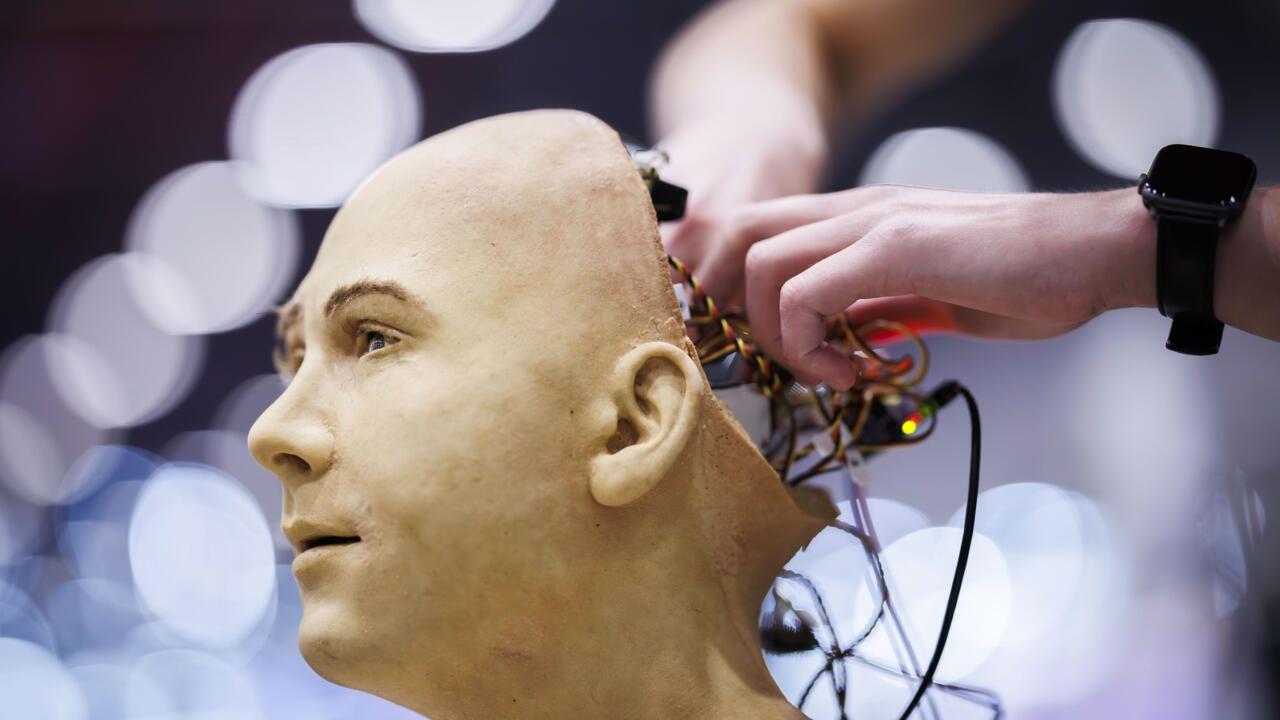UN Tech Chief Calls for Urgent Global Approach to AI Regulation
3 Sources
3 Sources
[1]
Urgent need for 'global approach' on AI regulation: UN tech chief
The world urgently needs to find a global approach on regulating artificial intelligence, the United Nations' top tech chief said this week, warning that fragmentation could deepen risks and inequalities. Doreen Bogdan-Martin, head of the UN's International Telecommunications Union (ITU) agency, told AFP she hoped that AI "can actually benefit humanity". But as concerns mount over the risks posed by the fast-moving technology -- including fears of mass job losses, the spread of deepfakes and disinformation, and society's fabric fraying -- she insisted that regulation was key. "There's an urgency to try to get... the right framework in place," she said, stressing the need for "a global approach". Her comments came after US President Donald Trump this week unveiled an aggressive, low-regulation strategy aimed at ensuring the United States stays ahead of China on AI. Among more than 90 proposals, Trump's plan calls for sweeping deregulation, with the administration promising to "remove red tape and onerous regulation" that could hinder private sector AI development. Asked if she had concerns about an approach that urges less, not more, regulation of AI technologies, Bogdan-Martin refrained from commenting, saying she was "still trying to digest" the US plan. 'Critical' "I think there are different approaches," she said. "We have the EU approach. We have the Chinese approach. Now we're seeing the US approach. I think what's needed is for those approaches to dialog," she said. At the same time, she highlighted that "85% of countries don't yet have AI policies or strategies". A consistent theme among those strategies that do exist is the focus on innovation, capacity building and infrastructure investments, Bogdan-Martin said. "But where I think the debate still needs to happen at a global level is trying to figure out how much regulation, how little regulation, is needed," she said. Bogdan-Martin, who grew up in New Jersey and has spent most of her more than three-decade career at the ITU, insisted the Geneva-based telecoms agency that sets standards for new technologies was well-placed to help facilitate much-needed dialog on the issue. "The need for a global approach I think is critical," she said, cautioning that "fragmented approaches will not help serve and reach all". As countries and companies sprint to cement their dominance in the booming sector, there are concerns that precautions could be thrown to the wind -- and that those who lose the race or do not have the capacity to participate will be left behind. 'Huge gap' The ITU chief hailed "mind-blowing" advances within artificial intelligence, with the potential to improve everything from education to agriculture to health care -- but insisted the benefits must be shared. Without a concerted effort, there is a risk that AI will end up standing for "advancing inequalities", she warned, cautioning against deepening an already dire digital divide worldwide. "We have 2.6 billion people that have no access to the internet, which means they have no access to artificial intelligence", Bogdan-Martin pointed out. "We have to tackle those divides if we're actually going to have something that is beneficial to all of humanity." Bogdan-Martin, the first woman to serve as ITU secretary-general in the organization's nearly 160-year history, also stressed the need to get more women into the digital space. "We have a huge gap," she said. "We definitely don't have enough women... in artificial intelligence." The 59-year-old mother of four said it was "a big honor" to be the first woman in her position, to be "breaking the glass ceiling (and) paving the path for future generations". But she acknowledged there was a lot of pressure, "not just to achieve, but to almost overachieve". Bogdan-Martin, who is being backed by the Trump administration to stand for re-election when her four-year mandate ends next year, said she was eager to stay on for a second term. "There is a lot to do."
[2]
Urgent need for 'global approach' on AI regulation: UN tech chief
Geneva (AFP) - The world urgently needs to find a global approach on regulating artificial intelligence, the United Nations' top tech chief said this week, warning that fragmentation could deepen risks and inequalities. Doreen Bogdan-Martin, head of the UN's International Telecommunications Union (ITU) agency, told AFP she hoped that AI "can actually benefit humanity". But as concerns mount over the risks posed by the fast-moving technology -- including fears of mass job losses, the spread of deepfakes and disinformation, and society's fabric fraying -- she insisted that regulation was key. "There's an urgency to try to get... the right framework in place," she said, stressing the need for "a global approach". Her comments came after US President Donald Trump this week unveiled an aggressive, low-regulation strategy aimed at ensuring the United States stays ahead of China on AI. Among more than 90 proposals, Trump's plan calls for sweeping deregulation, with the administration promising to "remove red tape and onerous regulation" that could hinder private sector AI development. Asked if she had concerns about an approach that urges less, not more, regulation of AI technologies, Bogdan-Martin refrained from commenting, saying she was "still trying to digest" the US plan. 'Critical' "I think there are different approaches," she said. "We have the EU approach. We have the Chinese approach. Now we're seeing the US approach. I think what's needed is for those approaches to dialogue," she said. At the same time, she highlighted that "85 percent of countries don't yet have AI policies or strategies". A consistent theme among those strategies that do exist is the focus on innovation, capacity building and infrastructure investments, Bogdan-Martin said. "But where I think the debate still needs to happen at a global level is trying to figure out how much regulation, how little regulation, is needed," she said. Bogdan-Martin, who grew up in New Jersey and has spent most of her more than three-decade career at the ITU, insisted the Geneva-based telecoms agency that sets standards for new technologies was well-placed to help facilitate much-needed dialogue on the issue. "The need for a global approach I think is critical," she said, cautioning that "fragmented approaches will not help serve and reach all". As countries and companies sprint to cement their dominance in the booming sector, there are concerns that precautions could be thrown to the wind -- and that those who lose the race or do not have the capacity to participate will be left behind. 'Huge gap' The ITU chief hailed "mind-blowing" advances within artificial intelligence, with the potential to improve everything from education to agriculture to health care -- but insisted the benefits must be shared. Without a concerted effort, there is a risk that AI will end up standing for "advancing inequalities", she warned, cautioning against deepening an already dire digital divide worldwide. "We have 2.6 billion people that have no access to the internet, which means they have no access to artificial intelligence", Bogdan-Martin pointed out. "We have to tackle those divides if we're actually going to have something that is beneficial to all of humanity." Bogdan-Martin, the first woman to serve as ITU secretary-general in the organisation's nearly 160-year history, also stressed the need to get more women into the digital space. "We have a huge gap," she said. "We definitely don't have enough women... in artificial intelligence." The 59-year-old mother of four said it was "a big honour" to be the first woman in her position, to be "breaking the glass ceiling (and) paving the path for future generations". But she acknowledged there was a lot of pressure, "not just to achieve, but to almost overachieve". Bogdan-Martin, who is being backed by the Trump administration to stand for re-election when her four-year mandate ends next year, said she was eager to stay on for a second term. "There is a lot to do."
[3]
Urgent need for 'global approach' on AI regulation: UN tech chief - The Economic Times
The UN's top tech official, Doreen Bogdan-Martin, says the world urgently needs a global approach to AI regulation. Without it, risks and inequalities could grow. She warns that fragmented strategies and lack of access in poorer regions could deepen divides, stressing the need for inclusive, balanced, and fair AI development.The world urgently needs to find a global approach on regulating artificial intelligence, the United Nations' top tech chief said this week, warning that fragmentation could deepen risks and inequalities. Doreen Bogdan-Martin, head of the UN's International Telecommunications Union (ITU) agency, told AFP she hoped that AI "can actually benefit humanity". But as concerns mount over the risks posed by the fast-moving technology -- including fears of mass job losses, the spread of deepfakes and disinformation, and society's fabric fraying -- she insisted that regulation was key. "There's an urgency to try to get... the right framework in place," she said, stressing the need for "a global approach". Her comments came after US President Donald Trump this week unveiled an aggressive, low-regulation strategy aimed at ensuring the United States stays ahead of China on AI. Among more than 90 proposals, Trump's plan calls for sweeping deregulation, with the administration promising to "remove red tape and onerous regulation" that could hinder private sector AI development. Asked if she had concerns about an approach that urges less, not more, regulation of AI technologies, Bogdan-Martin refrained from commenting, saying she was "still trying to digest" the US plan. 'Critical' "I think there are different approaches," she said. "We have the EU approach. We have the Chinese approach. Now we're seeing the US approach. I think what's needed is for those approaches to dialogue," she said. At the same time, she highlighted that "85 percent of countries don't yet have AI policies or strategies". A consistent theme among those strategies that do exist is the focus on innovation, capacity building and infrastructure investments, Bogdan-Martin said. "But where I think the debate still needs to happen at a global level is trying to figure out how much regulation, how little regulation, is needed," she said. Bogdan-Martin, who grew up in New Jersey and has spent most of her more than three-decade career at the ITU, insisted the Geneva-based telecoms agency that sets standards for new technologies was well-placed to help facilitate much-needed dialogue on the issue. "The need for a global approach I think is critical," she said, cautioning that "fragmented approaches will not help serve and reach all". As countries and companies sprint to cement their dominance in the booming sector, there are concerns that precautions could be thrown to the wind -- and that those who lose the race or do not have the capacity to participate will be left behind. 'Huge gap' The ITU chief hailed "mind-blowing" advances within artificial intelligence, with the potential to improve everything from education to agriculture to health care -- but insisted the benefits must be shared. Without a concerted effort, there is a risk that AI will end up standing for "advancing inequalities", she warned, cautioning against deepening an already dire digital divide worldwide. "We have 2.6 billion people that have no access to the internet, which means they have no access to artificial intelligence", Bogdan-Martin pointed out. "We have to tackle those divides if we're actually going to have something that is beneficial to all of humanity." Bogdan-Martin, the first woman to serve as ITU secretary-general in the organisation's nearly 160-year history, also stressed the need to get more women into the digital space. "We have a huge gap," she said. "We definitely don't have enough women... in artificial intelligence." The 59-year-old mother of four said it was "a big honour" to be the first woman in her position, to be "breaking the glass ceiling (and) paving the path for future generations". But she acknowledged there was a lot of pressure, "not just to achieve, but to almost overachieve". Bogdan-Martin, who is being backed by the Trump administration to stand for re-election when her four-year mandate ends next year, said she was eager to stay on for a second term. "There is a lot to do."
Share
Share
Copy Link
Doreen Bogdan-Martin, head of the UN's International Telecommunications Union, emphasizes the need for a global framework to regulate AI, warning of potential risks and inequalities if a fragmented approach persists.
UN Tech Chief Urges Global Approach to AI Regulation
Doreen Bogdan-Martin, the head of the UN's International Telecommunications Union (ITU), has called for an urgent global approach to regulating artificial intelligence. In a recent interview, she emphasized the critical need for a unified framework to address the challenges posed by rapidly advancing AI technologies
1
.Concerns Over Fragmented Approaches

Source: ET
Bogdan-Martin expressed concern about the potential risks of fragmented regulatory approaches. She highlighted the existence of different strategies, including those from the EU, China, and the recently unveiled US plan. The UN tech chief stressed the importance of dialogue between these approaches to create a cohesive global strategy
2
.Current State of AI Policies Worldwide
A striking statistic revealed by Bogdan-Martin is that 85% of countries currently lack AI policies or strategies. Among those that do have strategies in place, there is a consistent focus on innovation, capacity building, and infrastructure investments. However, she emphasized the need for a global-level debate to determine the appropriate balance of regulation
1
.Potential Benefits and Risks of AI

Source: France 24
While acknowledging the "mind-blowing" advances in AI and its potential to improve various sectors such as education, agriculture, and healthcare, Bogdan-Martin also warned of the risks. These include fears of mass job losses, the spread of deepfakes and disinformation, and the potential fraying of society's fabric
3
.Addressing the Digital Divide
A key concern highlighted by the ITU chief is the digital divide and its implications for AI access. Bogdan-Martin pointed out that 2.6 billion people lack internet access, effectively excluding them from the benefits of AI. She warned that without concerted efforts, AI could end up "advancing inequalities" rather than benefiting all of humanity
2
.Related Stories
Gender Gap in AI and Technology
As the first woman to serve as ITU secretary-general in the organization's 160-year history, Bogdan-Martin also emphasized the need to address the gender gap in the digital space, particularly in AI. She described the current situation as a "huge gap" and stressed the importance of increasing female participation in the field
3
.The Role of ITU in Facilitating Dialogue
Bogdan-Martin believes that the Geneva-based ITU, with its role in setting standards for new technologies, is well-positioned to facilitate the necessary global dialogue on AI regulation. She emphasized that fragmented approaches would not serve or reach all stakeholders effectively
1
.As the AI sector continues to boom and countries race to establish dominance, Bogdan-Martin's call for a balanced, inclusive, and fair approach to AI development and regulation becomes increasingly crucial. The challenge lies in creating a framework that fosters innovation while addressing the potential risks and ensuring equitable access to AI benefits across the globe.
References
Summarized by
Navi
Related Stories
Recent Highlights
1
ByteDance's Seedance 2.0 AI video generator triggers copyright infringement battle with Hollywood
Policy and Regulation

2
Demis Hassabis predicts AGI in 5-8 years, sees new golden era transforming medicine and science
Technology

3
Nvidia and Meta forge massive chip deal as computing power demands reshape AI infrastructure
Technology








